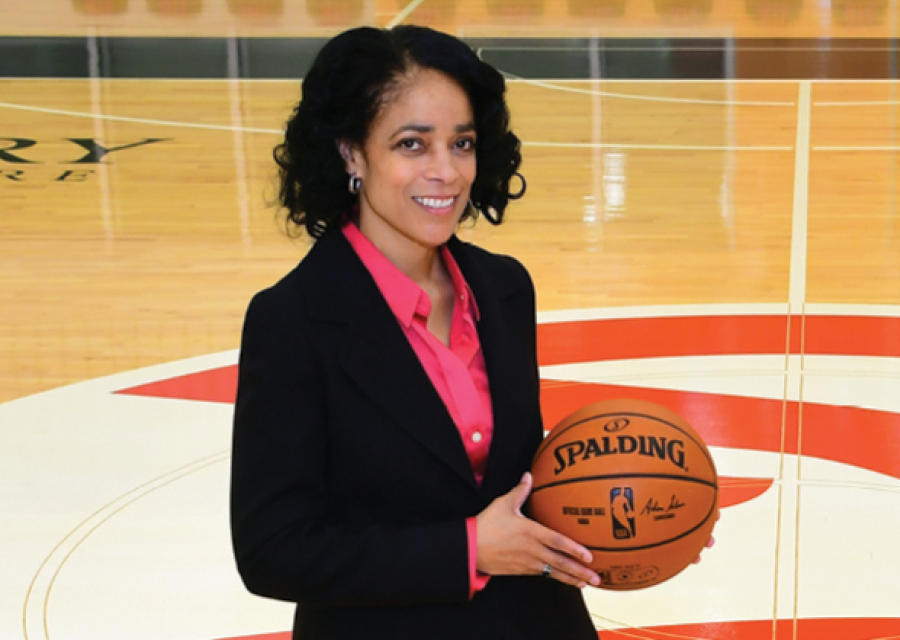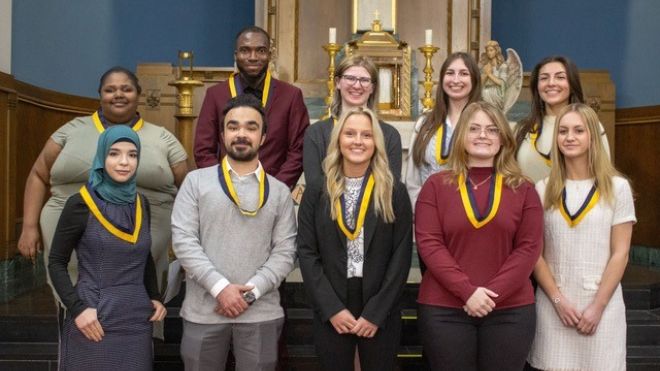
BUFFALO, NY - Michelle A. Leftwich ’87 tried to remain calm as she sat in a conference room at Chicago’s Hilton Palmer House waiting for the start of the National Basketball Association (NBA) draft lottery.
There to represent the Atlanta Hawks as the organization’s vice president, salary cap administration, Leftwich stood out as the sole female in the room and one of only two African Americans acting on behalf of an NBA team. She and her counterparts shared the same angst as they collectively watched the lottery machine dispense a combination of numbers that ultimately awarded the Hawks a No. 3 pick in the NBA draft.
“The draft is one of the best ways for teams to acquire star players so we were thrilled to land a spot where we did,” Leftwich recalls.
Sure, games are won or lost on the court with coaches and players but Leftwich and other salary cap gurus contribute to the success of their teams in a number of different ways. Chief among Leftwich’s responsibilities is to assist the Hawks’ general manager in analyzing potential trades of players and draft picks; assessing how much the club can spend signing talent; and forecasting the complexities of future free agency activity – “all of which can influence the team’s current and future roster,” Leftwich explains.
Hers is a high-stakes position, particularly for a team like Atlanta, which is in the market for potential franchise players. But Leftwich is used to playing in the pros.
Prior to the Hawks, she spent 20-plus years at the NBA league office in Manhattan, including 10 as vice president and assistant general counsel. Her work focused on ensuring each NBA team remained compliant with salary cap rules, whether it involved player contract matters or trade approvals. Leftwich was also part of the legal team that represented the NBA in its 2014 legal case that resulted in the ban of former Los Angeles Clippers owner Donald Sterling from the league following racist comments. And she sat on the NBA’s negotiating team for the league’s three most recent collective bargaining agreements (CBAs) with the players’ union.
“To have been able to play a significant role in developing, negotiating and drafting the NBA’s CBAs, which shape the future of the league and all its 30 teams, has to be among the most rewarding and engaging work in my career to date,” Leftwich says.
It’s paralleled only by her new role with the Hawks.
Leftwich assumed the position in fall 2017 and in doing so, became one of the NBA’s highest ranking women in basketball operations. Quite a trajectory for someone who never played the sport.
“I did cheer for the boys basketball team while at City Honors High School and later became the team’s student manager,” she says with a laugh.
Instead, Leftwich credits her Canisius accounting degree for getting her to the NBA’s upper echelon.
“The job market for attorneys wasn’t great when I graduated from New York University School of Law so we were told to play to our strengths if we wanted to ensure work following graduation,” Leftwich recalls. “Mine had always been numbers.”
Rather than pursue litigation, Leftwich went to work in a law firm’s corporate legal department. A colleague later recommended her for a junior associate job negotiating licensing agreements at the NBA. Leftwich made the jump and ultimately landed work managing salary cap and other player-related matters.
“When I made the switch from corporate transactional work, I didn’t know the league’s salary cap rules, which are complex and many. So I learned on the job,” Leftwich says. And for the past two decades she was a daily advisor to the 30 NBA teams on salary cap and CBA-related matters.
Today, Leftwich is one of the best in her class and the Atlanta Hawks are capitalizing on her expertise to help rebuild its roster. Still, Leftwich represents more than a single NBA team. Her position puts her among a rising vanguard of females who are finding their way into NBA front offices across the league where, according to Bleacher Report, not a single woman could be found as recently as 2010.
“I don’t know what the landscape looks like in the other professional sports leagues, but there’s definitely a trend within the NBA to address race and gender diversity. That’s a good thing and I’m proud to be part of it,” Leftwich concludes.



